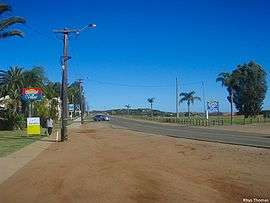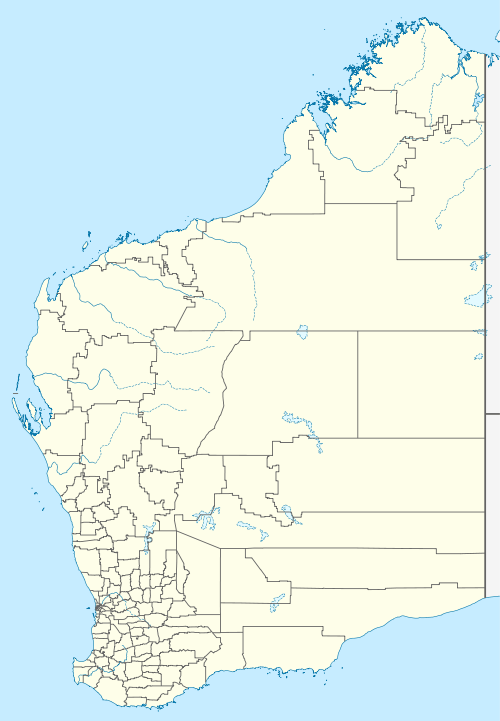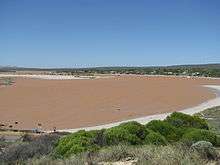Kalbarri, Western Australia
Kalbarri is a coastal town in the Mid West region located 592 km (368 mi) north of Perth, Western Australia.[2] The town is found at the mouth of the Murchison River and has an elevation of 6 metres (20 ft).[3] It is connected by public transport to Perth via Transwa coach services N1 and N2.
| Kalbarri Western Australia | |||||||||
|---|---|---|---|---|---|---|---|---|---|
 Kalbarri Town | |||||||||
 Kalbarri | |||||||||
| Coordinates | 27.71°S 114.16°E | ||||||||
| Population | 1,349 (2016 census)[1] | ||||||||
| Established | 1951 | ||||||||
| Postcode(s) | 6536 | ||||||||
| Elevation | 6 m (20 ft) | ||||||||
| Location |
| ||||||||
| LGA(s) | Shire of Northampton | ||||||||
| State electorate(s) | Moore, North West Central | ||||||||
| Federal Division(s) | Durack | ||||||||
| |||||||||
History
Kalbarri is a part of the traditional lands of the Nanda people who were recognised as the traditional owners of more than 17,000 square kilometres (6,600 sq mi) of land and water in the Yamatji region, in Western Australia, on 28 November 2018. Nanda people have been awarded exclusive native title rights over several key areas including Paradise Flats, Bully, Wilgie Mia, Mooliabatanya and Syphon pools.
The story of the Beemarra serpent is the central dreaming story of Nanda people. The Beemarra is, according to Nanda culture, an ancestral being responsible for the creation of the land and waters in the region[4]
Kalbarri was named after an Aboriginal man from the Nanda tribe and is also the name of an edible seed.[5]
The first European people to visit the area were the crew of the trading ship Batavia, belonging to the Dutch East India Company, who put two mutinous crew members ashore near Bluff Point just south of the town. The cliffs near the river mouth were named after another trading ship, the Zuytdorp, that was wrecked there in 1712.[6]
The area became a popular fishing and tourist spot in the 1940s and by 1948 the state government declared a townsite. Lots were soon surveyed and the town was gazetted in 1951.
Tourism
The town is geared towards tourism and fishing, with attractions including the daily pelican feeding, the Kalbarri National Park, Murchison River Gorge and the Murchison River. There are two charter boats to go on to view the Murchison River. The town attracts 200,000 tourists every year, with the population of the town swelling to 8,000 during holiday seasons. Electricity to the town and hotels is supplied by a fragile 33kV powerline from the central grid. To increase grid stability, a 5MW/2MWh grid battery is installed.[7]
The Kalbarri National Park is home to a phenomenon of geography and geology known as the Z Bend, a walking track, and "Nature's Window", a rock formation overlooking hundreds of kilometres of Murchison River. The Rainbow Jungle (The Australian Parrot Breeding Centre), located a few kilometres south of the town centre, features hundreds of exotic species of birds in their native habitat plus a walk-in cage allowing humans to interact with the birds. Red Bluff and other coastal cliffs and formations are located south of the town.
 Murchison River mouth at sunset
Murchison River mouth at sunset Murchison River after heavy rain
Murchison River after heavy rain
Climate
Kalbarri lies in the warm-summer Mediterranean climate zone (Köppen: Csa). Winters are mild with warm days and occasional heavy precipitation, while summers are hot and dry.[8]
| Climate data for Kalbarri | |||||||||||||
|---|---|---|---|---|---|---|---|---|---|---|---|---|---|
| Month | Jan | Feb | Mar | Apr | May | Jun | Jul | Aug | Sep | Oct | Nov | Dec | Year |
| Record high °C (°F) | 46.4 (115.5) |
46.3 (115.3) |
47.2 (117.0) |
39.5 (103.1) |
36.2 (97.2) |
30.9 (87.6) |
30.5 (86.9) |
32.9 (91.2) |
37.0 (98.6) |
41.2 (106.2) |
42.4 (108.3) |
44.0 (111.2) |
47.2 (117.0) |
| Average high °C (°F) | 33.2 (91.8) |
34.2 (93.6) |
32.6 (90.7) |
29.5 (85.1) |
26.0 (78.8) |
23.0 (73.4) |
21.8 (71.2) |
22.5 (72.5) |
24.0 (75.2) |
26.3 (79.3) |
28.3 (82.9) |
31.2 (88.2) |
27.7 (81.9) |
| Average low °C (°F) | 19.6 (67.3) |
20.7 (69.3) |
19.2 (66.6) |
16.3 (61.3) |
13.2 (55.8) |
11.0 (51.8) |
9.7 (49.5) |
9.9 (49.8) |
10.8 (51.4) |
12.7 (54.9) |
15.0 (59.0) |
17.5 (63.5) |
14.6 (58.3) |
| Record low °C (°F) | 10.9 (51.6) |
11.9 (53.4) |
10.0 (50.0) |
3.6 (38.5) |
3.7 (38.7) |
1.1 (34.0) |
−1.3 (29.7) |
−0.4 (31.3) |
1.9 (35.4) |
4.1 (39.4) |
6.7 (44.1) |
8.1 (46.6) |
−1.3 (29.7) |
| Average precipitation mm (inches) | 5.5 (0.22) |
7.9 (0.31) |
12.6 (0.50) |
19.3 (0.76) |
54.3 (2.14) |
77.1 (3.04) |
70.5 (2.78) |
47.7 (1.88) |
23.9 (0.94) |
13.8 (0.54) |
6.8 (0.27) |
3.8 (0.15) |
343.6 (13.53) |
| Source: [9] | |||||||||||||
In popular culture
Kalbarri was featured at the end of the film Wolf Creek when character Ben Mitchell (Nathan Phillips) was airlifted to hospital from Kalbarri Airport.
In the television series Prison Break, character James Whistler states he is originally from Kalbarri.
References
- Australian Bureau of Statistics (27 June 2017). "Kalbarri (Urban Centre/Locality)". 2016 Census QuickStats. Retrieved 30 October 2019.

- "Main Roads - Distances from Perth". 2006. Archived from the original on 26 July 2008. Retrieved 7 September 2008.
- "Australian Bureau of Meteorology - Climate Summary statistics KALBARRI". 2008. Retrieved 8 September 2008.
- "Kalbarri Aboriginal history". 2008. Archived from the original on 22 July 2008. Retrieved 8 September 2008.
- Western Australian Land Information Authority. "History of country town names – K". Retrieved 9 September 2008.
- "Kalbarri - Western Australia". 2006. Archived from the original on 19 July 2008. Retrieved 8 September 2008.
- Vorrath, Sophie (17 December 2019). "Western Australia's first big battery delivered to Kalbarri microgrid". One Step Off The Grid.
- Beck, Hylke E.; Zimmermann, Niklaus E.; McVicar, Tim R.; Vergopolan, Noemi; Berg, Alexis; Wood, Eric F. (30 October 2018). "Present and future Köppen-Geiger climate classification maps at 1-km resolution". Scientific Data. Nature Research. 5: 180214. doi:10.1038/sdata.2018.214. ISSN 2052-4463. PMC 6207062. PMID 30375988.
- "Climate statistics for Kalbarri". Bureau of Meteorology. Retrieved 20 December 2018.